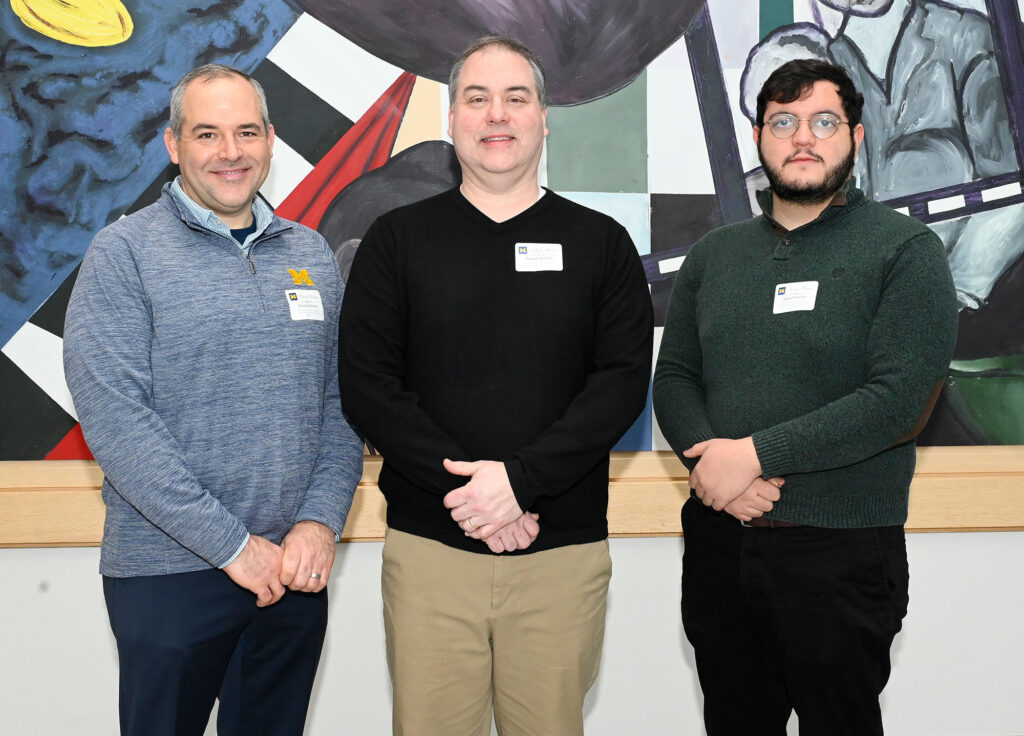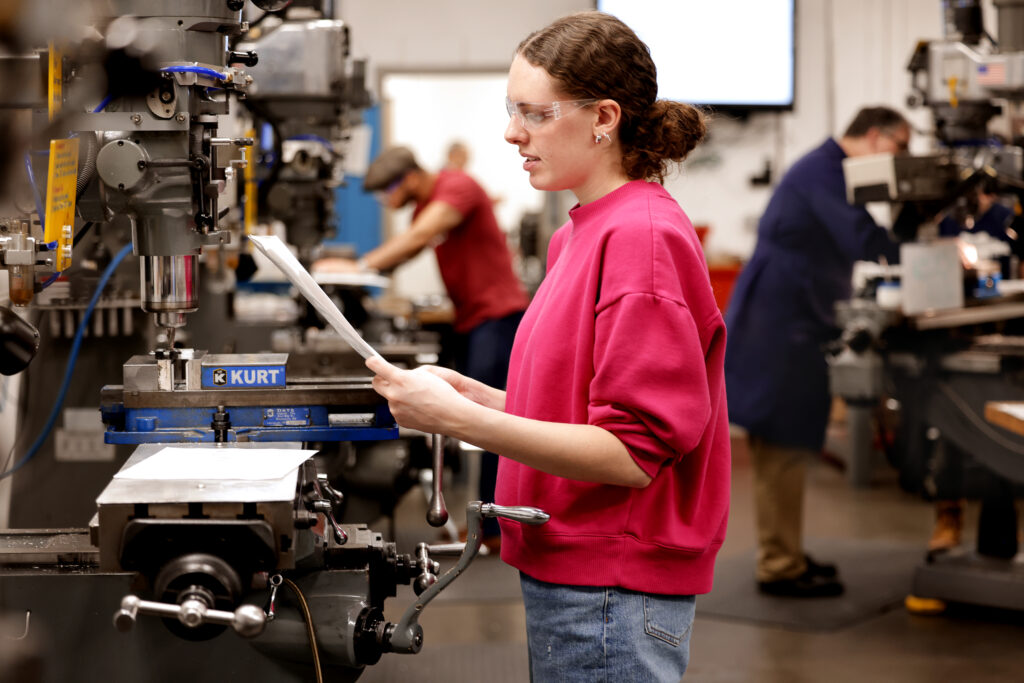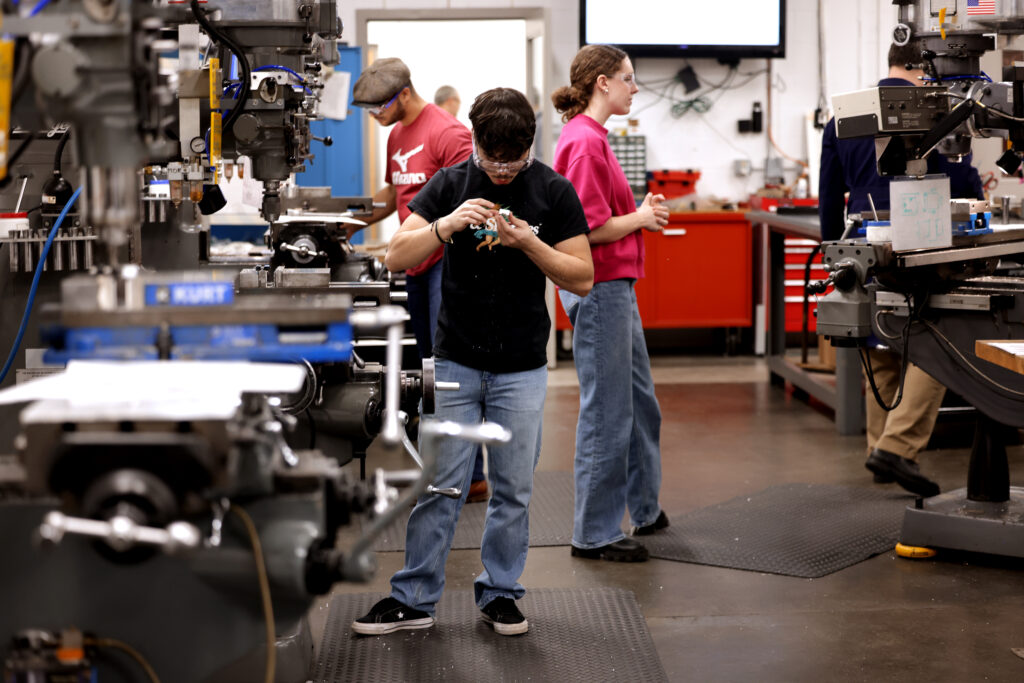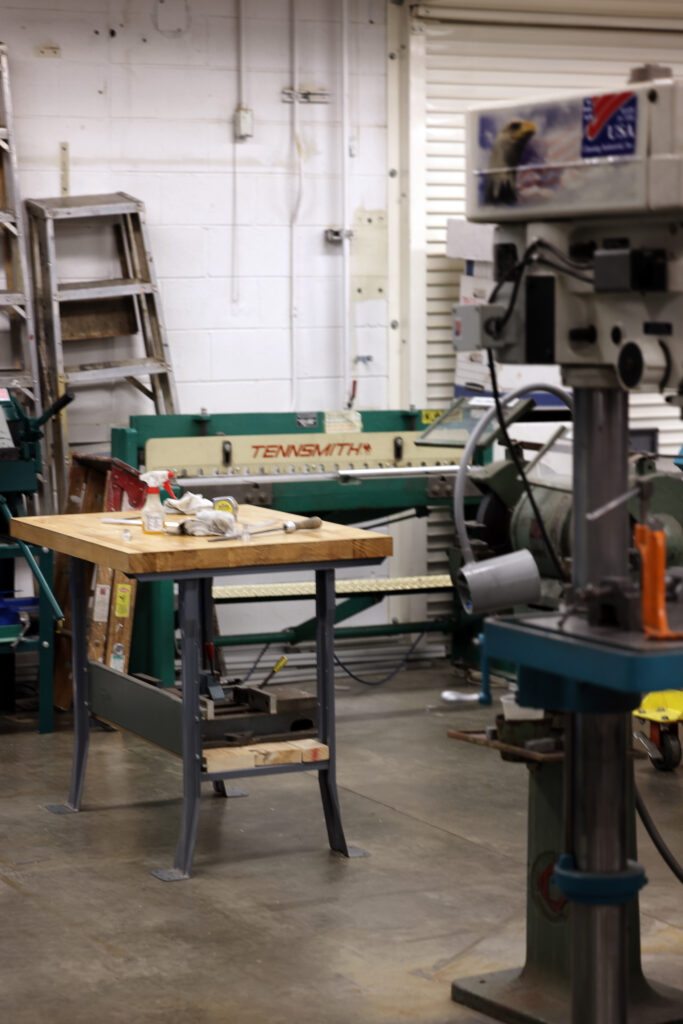
Experiential learning is critical to engineering education. In the U-M Department of Mechanical Engineering, the heart of the undergraduate curriculum is a series of design courses through which students make use of mills, lathes, and other large machines to transform raw materials into parts and mechanisms. These are then deployed in projects aimed at developing foundational skills for future careers in industry and academia – but what if a student can’t reach, maneuver, or manipulate those machines?
The Mechanical Engineering Undergraduate Machine Shop team has received a University of Michigan’s Distinguished Diversity Leaders Award. This award serves to recognize and celebrate staff members’ dedication and commitment to fostering a diverse, inclusive, and welcoming campus culture. The shop team has received this award for their work to improve accessibility in the ME undergraduate machine shop and for the development of a new framework for evaluating industry standard equipment setups.

“We want students to feel welcome and comfortable,” said Don Wirkner, instructional lab manager in mechanical engineering. “How can we make the experience working on the machines more inclusive, more accommodating?” This question has informed many of Wirkner’s decisions and policies around the shop for several years.
Then, at the beginning of the Fall 2022 semester, a student participating in a design course, who used a power wheelchair, needed to make use of the shop’s machinery to complete training and manufacturing of parts. These machines, said Mike Klein, engineering technician in mechanical engineering, “were built for very tall men a hundred years ago, standing for long hours, and their design really hasn’t changed much since. They’re big, and they’re heavy. They’re designed for a very specific kind of person.”
While Wirkner had been interested in expanding accessibility in ME labs since joining the department in 2019, students generally did not require assistance. Some assists, like raised work platforms, were available, but these were not the right accommodations for their new student. Examining the shop’s setup through a different lens, Wirkner found that there were additional needs, and available solutions were not ideal.
“The team could have assigned the student an assistant who would operate the machines for them,” said Susan Cheng, manager of diversity and inclusion in mechanical engineering. “But they believed it was critical that all students have the chance to experience the feeling of accomplishment that is unique to machining something on your own from start to finish.”
This was not quick to achieve, however. To begin making accommodations for students who use assistive mobility devices to work the shop’s large machinery, the team would need to build a proposal, and that required a method to evaluate each machine beforehand.
In concert with the student, the team began by researching guidelines from NGOs and professional organizations, scholarly papers, and equipment setups at peer institutions. “The first thing we did,” said Kemal Duran, design instruction engineer in mechanical engineering, “was we hit the books, trying to figure out what the general standards are for student accommodations, for people with wheelchairs, or for other people with other specific disabilities.”

The team wanted their solutions to be wide-reaching, to address the needs of as many students – current and future – as possible, but they were unable to find, through research, an established framework to do so. “We really found that there is no standard for anything outside of walkways, doorways, and tables,” said Wirkner. “There are some basic ADA standards, but there just isn’t a lot of documentation out there, and as engineers, we need criteria.”
Fortunately, though the framework they were searching for was not readily available from outside sources, the team found that their research could inform the development of their own. “So, we actually set up a system for assessing which of our machines were accessible and which ones just aren’t,” said Duran.
Each machine setup should be assessed, according to the team’s new system, for reach, maneuverability, and manipulation (RMM, for short). Can the operator reach all controls and display panels? Does the operator have the ability to maneuver around the machine at will? Is the operator able to apply enough pressure or torque to manipulate controls? This framework informed the team’s proposal and helped to justify the changes they wanted to make.

Ultimately, the team was able to engineer new methods for adjusting display panels and extending, or relocating, control interfaces on six mills and four lathes. They separately assessed the general layout and workflow of the machine shop and several other design laboratories, and existing workbenches were replaced with either smaller or height-adjustable tables. This also expanded aisleways, allowing students to enjoy greater navigation of the shop and flexibility with seating options.
“What was unexpected, afterwards, was that…we were getting feedback from other students – those who were shorter – that they were having an easier time using the machines too,” Wirkner said.
These standard machine setups were not designed with every body type in mind, and it turned out that, when work was done to begin making them more accessible, the team discovered that many students could benefit from the targeted changes they were making, and those they hope to make in the future.
Next, Wirkner and his team aim to consider how accessibility can be promoted in more spaces on campus, to share their work widely, and to deepen their knowledge of universal design. As they see it, there’s still a lot of work to be done.
“I think we had a pretty good first pass,” Wirkner said. “We feel that there is much more that we can do, as time and funding become available. Things that we think are small and simple can collectively make a significant difference. Each step gets us closer to full participation for everyone.”
The Distinguished Diversity Leaders Award is managed by the ECRT Office and sponsored by the Office of the Provost and University Human Resources. The full list of 2024 recipients can be found in the University Record.